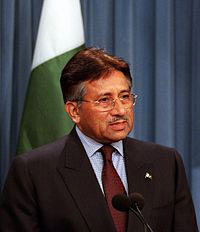USA forces Pakistan to restore democracy
The U.S. government and some European countries exert pressure on Pakistan president Gen. Pervez Musharraf to return to democracy. Musharraf called a meeting to discuss the forth-coming parliamentary elections.

Some nations they were reviewing aid to the Muslim nation.
Musharraf, who seized power in a 1999 coup, suspended the constitution Saturday ahead of a Supreme Court ruling on whether his recent re-election as president was legal. He ousted independent-minded judges, put a stranglehold on the media and granted sweeping powers to authorities to crush dissent.
Opposition groups put the number of arrests at more than 3,500, although the government reported half that.
U.S. President George W. Bush urged Musharraf - who has been rewarded for his support for the U.S.-led fight against terrorism with billions of dollars in aid -to hold parliamentary elections as originally scheduled in January.
"Our hope is that he will restore democracy as quickly as possible," Bush said in Washington, though he declined to discuss what action would be taken if Musharraf ignored his request. "It's a hypothetical. I certainly hope he does take my advice."
There did not appear to be a unified position among senior Pakistani officials on when the vote should be held. The attorney general said it would take place as scheduled, but then conceded there was a chance of delay. Prime Minister Shaukat Aziz also left open the possibility of a postponement.
Aziz said he would chair a Cabinet meeting later Tuesday to try to hammer out a timeline. An agreement was still needed on how to hold polls "in a smooth, transparent and peaceful manner," he said.
Many see Musharraf's imposition of emergency rule as a last-ditch attempt to cling to power.
Though public anger was mounting in the nation of 160 million people, which has been under military rule for much of its 60-year history, apathy and cynicism about traditionally elitist politics could work in Musharraf's favor. Demonstrations so far have been limited largely to activists, rights workers and lawyers - angered by his fervent attacks on the judiciary. All have been quickly and sometimes brutally stamped out.
Musharraf's leadership has been threatened by the Islamic militant movement that has spread from border regions to the capital, the reemergence of political rival and former Prime Minister Benazir Bhutto, and an increasingly defiant Supreme Court, which has been purged in the last two days.
Musharraf told foreign ambassadors at his official residence Monday that the country remained committed to completing its transitionto democracy.
"I am determined to remove my uniform once we correct these pillars - the judiciary, the executive and the parliament," Musharraf was quoted as saying by state-run Pakistan Television.
"I can assure you there will be harmony ... confidence will come back into the government, into law enforcement agencies."
Several foreign governments have expressed concern over the emergency measures. The Netherlands was the first to take action, announcing a freeze on almost all of its millions in assistance.
The Bush administration is reviewing U.S. aid to Pakistan , which has totaled more than US$10 billion ( EUR 6.9 billion) since 2001. But Defense Secretary Robert Gates suggested that military aid may not be affected so as not to disrupt Washington 's partnership with Pakistan in fighting al-Qaida and other militants.
The South Asian country has been hit by a string of suicide bombings in recent weeks blamed on extremists, including one last month targeting Bhutto that killed 145.
Since late Saturday, between 1,500 and 1,800 people have been detained nationwide, an Interior Ministry official said on condition of anonymity because he was not authorized to speak to the media.
But Ahsan Iqbal, a spokesman for former Prime Minister Nawaz Sharif's opposition party, said authorities had rounded up around 2,300 of its supporters. Other political activists, human rights groups and lawyers added another 1,200 detentions to that toll.
They included at least 173 workers and supporters of Bhutto, who has held talks in recent months with Musharraf over a possible alliance to fight extremism, said Pakistan People's Party spokesman Farhatullah Babar.
Lawyers - the driving force behind protests earlier this year when Musharraf tried unsuccessfully to fire independent-minded chief justice Iftikhar Mohammed Chaudhry - tried to stage rallies in major cities Monday, but were beaten and arrested.
Chaudhry was removed from his post on Saturday, just as the Supreme Court was preparing to rule on the validity of Musharraf's Oct. 6 re-election. Opponents say he should be disqualified because he contested the vote as army chief.
Chaudhry described the emergency declaration as a "naked attack" on the rule of law and said in a written statement that he was locked in his residence under virtual house arrest.
Musharraf also moved quickly to control the media. Police raided and briefly sealed a printing press belonging to Pakistan 's largest media group. Broadcasts by independent news networks remained blocked, and domestic transmissions of BBC and CNN were cut.
Subscribe to Pravda.Ru Telegram channel, Facebook, RSS!



